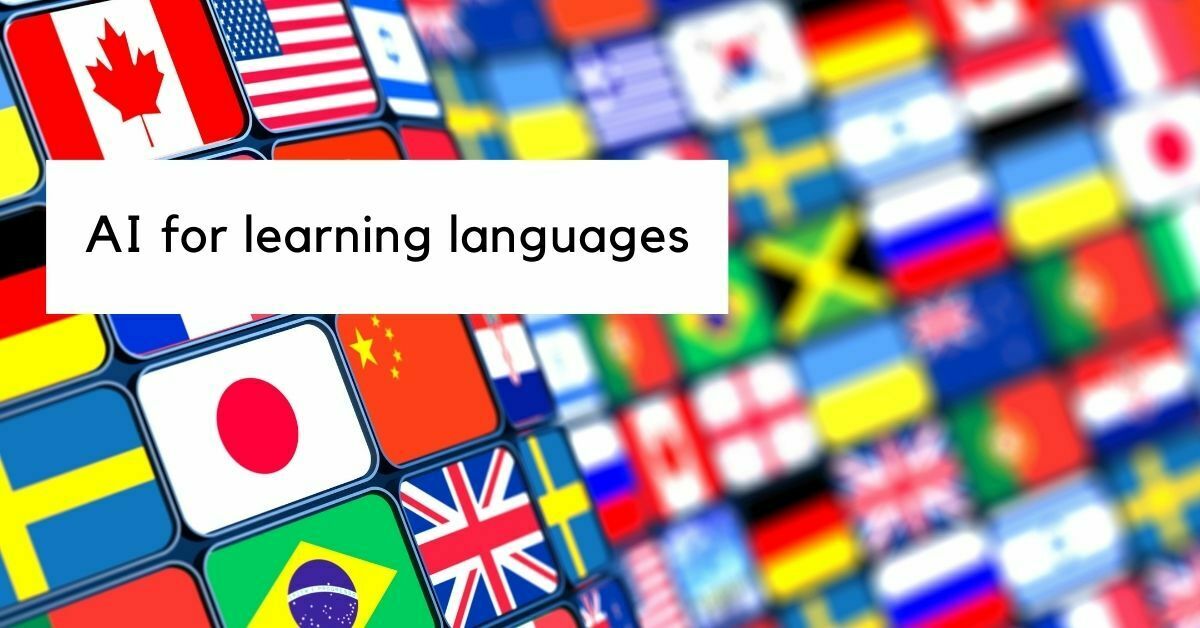8 AI tools for learning new languages
Learning a new language can be both challenging and rewarding. The good news is that artificial intelligence (AI) has made its way into the realm of language learning, transforming the process into something smoother, more engaging, and ultimately more effective. In this article, we’ll take a deep dive into the exciting world of AI tools for language learning. We’ll explore how these cutting-edge technologies are revolutionizing the way we approach language acquisition and, more importantly, we’ll introduce you to 8 exceptional AI tools that can assist you in mastering a new language with remarkable ease.
How AI tools enhance the traditional language learning process
Traditionally, language learning has relied on textbooks, audio recordings, and in-person classes. However, with the advancements in technology, AI tools have emerged as valuable resources that can significantly enhance the traditional language learning process.
1. Personalized learning experience
AI-powered language learning platforms can analyze your strengths, weaknesses, and learning patterns to tailor lessons and exercises specifically to your needs. By adapting the content and difficulty level to your skill level, AI tools ensure that you are consistently challenged without feeling overwhelmed.
2. Intelligent feedback and correction
AI tools excel in providing intelligent feedback and correction in language learning. Through advanced algorithms, these tools can analyze your writing or speaking exercises and identify errors in grammar, vocabulary, and pronunciation. They can then provide instant feedback and suggest corrections, helping you learn from your mistakes in real time. This immediate feedback accelerates the learning process and ensures that you are consistently improving your language skills.
3. Continuous learning and progress tracking
AI tools enable continuous learning and progress tracking in language learning. With features like spaced repetition, where the system intelligently schedules the review of previously learned material, you can reinforce your knowledge and prevent forgetting. Additionally, AI-powered platforms track your progress, monitor your learning habits, and provide insights into your strengths and areas for improvement. This data-driven approach allows you to set goals, measure progress, and stay motivated throughout your language learning journey.
4. Authentic language resources
AI tools provide language learners with access to a vast array of authentic language resources that were previously difficult to obtain. Through AI-powered platforms, you can access and interact with real-world content such as news articles, podcasts, videos, and social media posts in your target language. These resources expose you to the natural flow of the language, colloquial expressions, and cultural nuances, helping you develop a more authentic and nuanced understanding of the language.
8 AI tools you can use to learn new languages
Let’s delve into 8 AI tools that are making language learning an enjoyable and effective experience.
1. Duolingo
Price: Free with an optional premium subscription called Super Duolingo
Duolingo is a renowned language learning app that gamifies the process. It’s bite-sized lessons and interactive exercises make learning feel like a game. Plus, you can compete with friends and earn rewards, adding a touch of fun to your language journey.
- Gamified learning: Duolingo turns language learning into an engaging game with rewards and achievements, making it fun to progress.
- Interactive exercises: The app offers a variety of exercises, including listening, speaking, and writing, to develop comprehensive language skills.
- Progress tracking: Duolingo tracks your learning journey, showing your achievements and areas where you can improve.
- Streaks and challenges: Daily streaks and challenges encourage consistent practice, building a habit of learning.
- Language clubs: Join clubs to connect with fellow learners, fostering a sense of community and motivation.
2. Memrise
Price: Free with optional premium subscription
Memrise combines spaced repetition with vibrant visuals to enhance vocabulary retention. It’s like having flashcards that adapt to your learning curve. The optional subscription offers advanced features and an even broader range of courses.
- Spaced repetition: Memrise uses spaced repetition to reinforce learning and ensure better long-term retention of vocabulary.
- Rich multimedia: The app incorporates videos, audio clips, and visuals to make learning more dynamic and engaging.
- Advanced Vvcabulary: Memrise offers courses that cover a wide range of vocabulary, including colloquial phrases and idiomatic expressions.
- Offline mode: Download lessons for offline learning, allowing you to practice even without an internet connection.
3. Rosetta Stone
Price: Subscription-based with a free trial available
Rosetta Stone is a well-established language learning platform known for its immersive approach to language acquisition. The app offers a wide range of languages and focuses on developing your speaking, listening, reading, and writing skills. Its immersive method involves no translations, just direct language immersion to enhance your understanding.
- Immersion method: Rosetta Stone immerses you in the language from the start, helping you think and speak in your target language naturally.
- Comprehensive skills: Develop speaking, listening, reading, and writing skills to become proficient in your chosen language.
- TruAccent technology: Rosetta Stone’s TruAccent technology provides instant pronunciation feedback to improve your accent.
4. Mondly
Price: Free with optional premium subscription
Mondly is a language learning app that offers a range of interactive lessons and features to help you become proficient in your chosen language. It covers vocabulary, grammar, and conversation skills, making it a well-rounded language-learning tool.
- Virtual reality lessons: Mondly offers virtual reality (VR) lessons to provide an immersive language learning experience.
- Conversation practice: Users can practice conversational skills with Mondly’s chatbot, which provides real-time feedback.
- Gamified learning: The platform incorporates gamification elements to make learning fun and engaging.
- Speech recognition: Mondly’s speech recognition technology helps users improve their pronunciation and speaking skills.
5. Talkpal.ai
Price: Free with premium subscription options
Talkpal.ai is a language learning app that focuses on conversation practice with real human tutors. It offers personalized lessons tailored to your language goals and proficiency level. Whether you want to improve your speaking, listening, or overall language skills, Talkpal.ai provides a platform for one-on-one conversations with experienced tutors.
- Immersive conversations: Talkpal.ai offers real-life dialogues to enhance language retention and fluency, making learning feel like natural interaction.
- Dynamic active listening: Improve comprehension with Talkpal.ai’s adaptive listening exercises, tailored to your skill level for more effective learning.
- Real-time feedback: With Talkpal.ai, you receive immediate, personalized feedback as you engage in conversations. The app’s real-time analysis helps you refine your speaking and listening abilities on the spot.
6. GoPenPal.ai
Price: Free with premium subscription options
GoPenPal.ai is an AI-powered conversation partner platform that offers realistic conversations with AI chatbots. It enables you to practice your language skills by engaging in natural and dynamic conversations. GoPenPal.ai utilizes advanced AI algorithms to understand and respond to your messages, providing you with a conversational learning experience tailored to your language level.
- Adjusted to your level: GoPenPal.ai adjusts to your language proficiency level, ensuring a tailored and effective learning experience.
- Instant language support: You’ll get instant language support on GoPenPal.ai. You’ll also receive suggestions on your language usage for every message you send, along with a comprehensive breakdown of each message.
- Notebook: You can easily track challenging sentences by saving them in your personal notebook on GoPenPal.ai.
- Natural conversations: GoPenPal.ai focuses on natural conversations, providing you with authentic practice and improved fluency.
7. Lingvist
Pricing: Subscription-based with a free trial available
Lingvist is an AI-based language-learning app that focuses on vocabulary acquisition and contextual learning. It uses advanced algorithms and artificial intelligence to personalize the learning experience for each user, adapting to their skill level and goals.
- Adaptive learning: Lingvist adjusts to your progress, ensuring you’re always learning at the right level of difficulty.
- Accelerated language learning: Lingvist’s scientific approach and cutting-edge technology supercharge your language learning process, potentially allowing you to achieve fluency up to 10 times faster.
- Personalized learning: Lingvist adapts to your language proficiency level, ensuring tailored lessons for efficient learning.
- Real-world context: Learn within authentic real-world contexts, allowing you to understand how language is used in everyday life, making your language skills relevant and immediately usable.
8. Quazel
Pricing: Subscription-based with a free trial available
Quazel is an AI-powered language learning platform that focuses on pronunciation practice. It uses AI algorithms to analyze your pronunciation and provide instant feedback on your spoken language skills. Quazel offers interactive exercises, pronunciation drills, and voice recognition technology to help you improve your pronunciation and sound more like a native speaker.
- Personalized language courses: Quazel offers personalized language courses tailored to your skill level and learning style, ensuring a practical and customized learning experience.
- Customizable topics: Quazel offers a wide range of customizable topics, allowing you to choose subjects that interest you. Additionally, you can create your own scene by selecting your preferred topic and conversation partner. This flexibility ensures that your language learning experience aligns with your personal interests and goals.
- Real-time feedback: With Quazel, you can receive instant feedback on your grammar and vocabulary as you practice speaking. This feature ensures that you’re continuously improving your language skills, making your learning experience even more effective and engaging.
- Vibrant language-learning community: Join Quazel’s vibrant language-learning community on Discord, where you can receive feedback, participate in events, and make feature requests to enhance your learning journey.
Bottomline
Let’s summarize which of these AI tools for learning new languages are considered the best in various categories:
Best for gamified learning
- Duolingo: If you enjoy learning through games, Duolingo’s interactive and competitive features make it the top choice. Its bite-sized lessons and the ability to compete with friends add an element of fun to your language journey.
- Memrise: Memrise offers a gamified learning experience using flashcards. It adapts to your skill level and learning style, providing a dynamic and engaging way to learn new words and phrases.
Best for practical conversations
- Quazel: Quazel offers real-life practice by allowing users to talk about anything that interests them in a foreign language.
- Talkpal.ai: With Talkpal.ai, you’ll have AI-powered conversations that simulate real interactions, helping you improve your speaking and listening skills.
Best for immersive language learning
- Rosetta Stone: Rosetta Stone’s immersive approach takes you deep into the language without translations. It focuses on developing your speaking, listening, reading, and writing skills, providing a holistic language learning experience.
- Mondly: Mondly provides virtual reality (VR) lessons, where you can explore realistic scenarios and interact with virtual characters. This immersive approach enhances your language learning by simulating real-life situations.
Best for mastering pronunciation
- Rosetta Stone: Rosetta Stone not only prioritizes pronunciation but also aims to make you sound like a native speaker. Its immersive method ensures that you pick up the correct accent and intonation naturally.
Best for traveling abroad
- Duolingo: Duolingo is an excellent choice for travelers. Its interactive lessons and bite-sized exercises can help you quickly pick up essential phrases and vocabulary, making it easier to communicate in a foreign country.
- Babbel: Babbel’s focus on practical conversations is highly beneficial for travelers. It equips you with the language skills needed for everyday interactions, such as ordering food, asking for directions, and engaging with locals while exploring a new destination.
Best all-rounder
- Duolingo: Duolingo is a versatile language learning app suitable for beginners and those seeking a comprehensive language experience. It covers vocabulary, grammar, and more, making it an all-in-one learning tool.
- Memrise: Memrise offers a well-rounded approach with adaptive learning that caters to your learning style and skill level. It covers vocabulary, grammar, and phrases, providing a comprehensive language-learning experience.
- Quazel: Quazel stands out as an all-rounder, allowing you to have practical conversations while learning a new language. It seamlessly combines real-life interactions with language acquisition.
How do AI tools ensure accurate translations and interpretations?
AI tools ensure accurate translations and interpretations through advanced language processing techniques. They rely on machine learning algorithms and large datasets to analyze and understand different languages’ context, grammar, and nuances. By continuously learning from user interactions and feedback, AI tools improve their translation and interpretation capabilities over time.
AI tools use natural language processing (NLP) algorithms to break down sentences, identify grammar rules, and determine the most appropriate translations or interpretations. They can handle complex linguistic structures, idiomatic expressions, and cultural nuances, providing accurate and contextually relevant translations.
Final thoughts
AI tools have transformed language learning by offering innovative features and personalized learning experiences. Whether you’re a beginner or an advanced learner, integrating AI tools into your language-learning journey can significantly enhance your skills and help you achieve fluency in a new language.
Ultimately, the best tool for you will depend on your specific language learning goals and preferences. Consider what aspects of language learning are most important to you, whether it’s vocabulary building, conversation practice, or pronunciation improvement, and choose the tool that aligns best with your needs.







